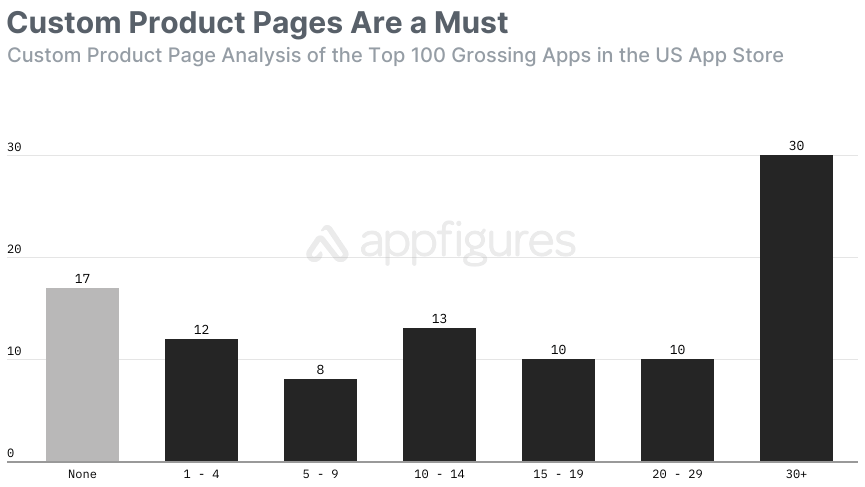Custom Product Pages Are the App Store's Secret Weapon
This is a single insight from This Week in Apps - Converting Much?. Check out the full article for more insights.
One of the most effective ways to turn views into downloads is to show users exactly what they're looking for.
On the App Store, that's where Custom Product Pages (CPPs) come in handy. Instead of a generic "here's everything my app does" listing, CPPs let you tailor your App Store page to match a specific user's intent (aka the keyword they searched for). That could be a feature, a need, or even a mood.
If you've run Apple Ads, you've had access to CPPs for a while. And if you have, you know how big of a lift pairing keywords with custom pages can deliver. But here's what makes this even more exciting: starting in iOS 26, CPPs will show up in organic search results, too.
I was curious to see if the top apps are already taking advantage of CPPs so I used the newest addition to our Apple Ads Intelligence to analyze the top 100 grossing apps and games in the US App Store:

I've been talking about optimizing screenshots for a while now so I knew CPPs were popular, but didn't expect them to be this popular!
- 83 of the top 100 grossing apps and games leverage CPPs.
- 30 of those apps and games use 30 or more CPPs.
- Only 17 apps and games don't use any CPPs at all, and there's a very clear reason for that.
That's not a niche growth hack. That's mainstream adoption.
What's interesting is that most apps are either all in or not using them at all. There's a clear hump around 30+ pages, suggesting that once developers see the results they scale them aggressively.
And the pattern isn't random. Both apps and games across a variety of categories leverage CPPs.
The biggest adopters of CPPs are the apps that live and die by conversion rates. Games like Candy Crush, PUBG Mobile, and Bingo Blitz dominate the 30+ CPP group. These are massive user acquisition machines where every 1% improvement in conversion compounds quickly. Apps like Facetune, PictureThis, and FaceApp are also very active. These are feature-rich tools where each CPP highlights a specific outcome — perfect smiles, different types of plants, filters, etc.
In all these cases, the CPP isn't just a landing page but rather a mini-pitch built around intent. FaceApp has a page that's focused on hairstyles for keywords like "hairstyle try on" and another showing various age filters for keywords like "aging app".
Who Isn't Using CPPs?
Some of the most recognizable names on the App Store don't use CPPs at all. Apps like YouTube, Netflix, Duolingo, Gmail, and ChatGPT all fall into the "none" bucket.
I was a bit surprised at first, but after a quick investigation I found two reasons for that:
- They don't rely on Apple Ads. YouTube, Netflix, and Duolingo don't use Apple Ads at all, and CPPs have only been useful there until now.
- They're category leaders. When your brand is the category, you may not think you need to explain what you do. Again, now that they'll impact organic conversion I bet you those 17 apps will be customizing just as well.
Take Duolingo. A user searching for "learn Spanish" could see a different page than someone searching "practice German." I showed how competitor Babbel's doing that with its CPPs in my last live stream.
Same for ChatGPT. Right now, they only show a single store page whether you're coming from "AI chat," "coding help," or "write a poem." With CPPs, they could align features to each intent and likely drive more installs and higher-quality users.
Developers, whether you're running Apple Ads, focus on ASO, or both, this is your next lever.
I'll have a tutorial for how to set up Custom Product Pages for organic discovery (ASO) out very soon. Make sure you're subscribed to the newsletter to get it when it drops.
App Intelligence for Everyone!
The insights in this report come right out of our App Intelligence platform, which offers access to download and revenue estimates, installed SDKs, and more! Learn more about the tools or schedule a demo with our team to get started.
Are you a Journalist? You can get access to our app and market intelligence for free through the Appfigures for Journalists program. Contact us for more details.
All figures included in this report are estimated. Unless specified otherwise, estimated revenue is always net, meaning it's the amount the developer earned after Apple and Google took their fee.

